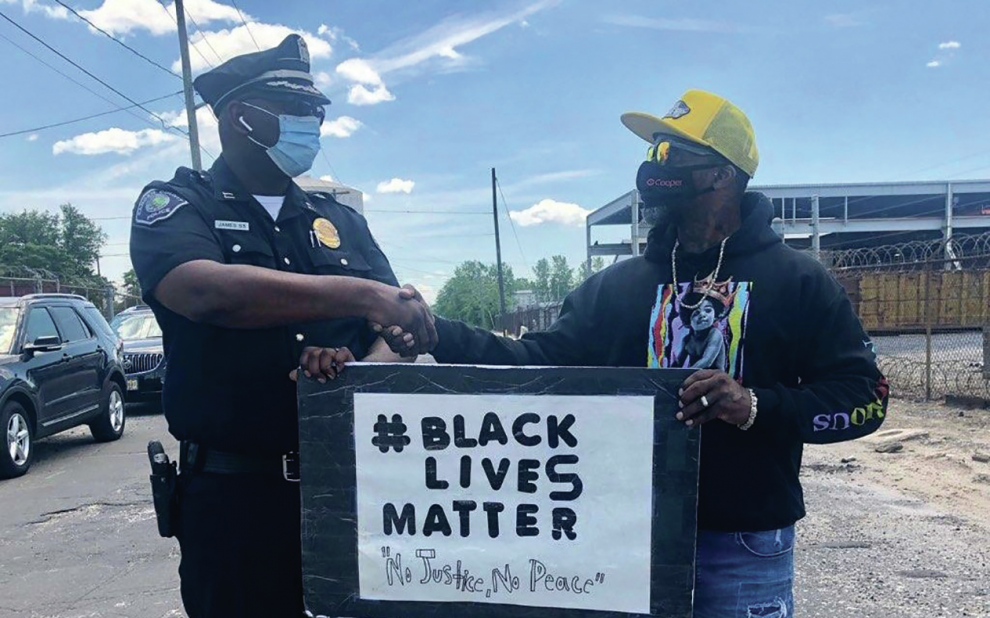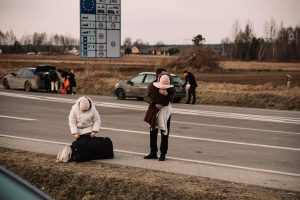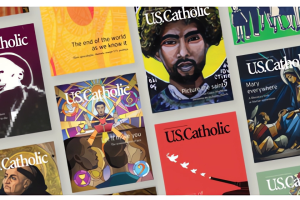The future of policing can be found in Camden, New Jersey, a small, largely impoverished city with 70,000 residents.
Camden is a city with a reputation for a crime problem that places stress on police. But it remained relatively calm during 2020’s regular disturbances, credited in large part to the city’s community policing reforms implemented by former chief J. Scott Thomson. At the height of last summer’s upheaval, a photo of a Camden officer joining hands with a Black Lives Matter demonstrator drew national media attention.
The gesture was no accident. That kind of outreach grew out of years of effort to reshape Camden’s police department and its relationship with its citizens. Once known as the nation’s murder capital, the city’s homicide numbers have decreased by more than half over eight years.
Msgr. Michael Mannion is a longtime chaplain with police forces in southern New Jersey, including Camden, across the Delaware River from Philadelphia. “Every officer is now a community relations officer,” says Mannion, noting the change in the department. Police are not expected just to make arrests; they are told to get involved in their neighborhood beats and get to know the people who live there. In Camden police officers regularly confront difficult social issues. Mannion says it’s not uncommon for officers to arrange the purchase of shoes for needy children.
In police circles, the murder of George Floyd is often viewed as a clear example of the worst among them. “A few officers are there for the wrong reasons,” says Marcus, a pseudonym for a minority officer in a large urban center. “They are perpetrators in uniform.”
Franciscan Father Johnpaul Cafiero, chaplain for the Illinois State Police, says that police often are tempted toward generalizations and stereotypes. However, they are victims of that temptation as well. “Many times the group is judged by certain bad apples,” he says, noting that the same holds true both for officers who patrol high crime areas and those suspicious of police.
Police often are tempted toward generalizations and stereotypes. However, they are victims of that temptation as well.
At the same time, police officers must deal with the pressures of their job. Mannion leads retreats for officers throughout southern New Jersey that often touch upon issues beyond the job, particularly family matters. A police chaplain, he says, ministers to an officer’s entire life issues. The questions are frequent: How much, or how little, should they tell their spouses about disturbing incidences on the job? They are often concerned about how much they bring home with them, how much their spouses can handle.
Cafiero says the state troopers to whom he ministers face their own issues. He’s been called to scenes of horrific incidences, such as the time a 4-year-old boy was thrown out of a car on an expressway and died. Or when an entire family, including four children, died in a fire.
Such incidences, he says, “are hardest on those troopers who have young children. My advice to them is to go home and hug their kids.”
Through it all, Cafiero sees faith as a force for understanding the vocation of police work. He worked in emergency services before joining the priesthood and finds that both vocations have much in common. “It’s the same job, only a different uniform,” he says.
A heavy vocation
Dr. Joel Fay’s practice has never been busier. Fay, a therapist in the San Francisco Bay area, is a retired police officer who counsels law enforcement officers. There’s little reason to wonder why he is so busy these days. The year 2020 began with the COVID-19 pandemic, putting police in harm’s way as they went to work in towns and cities. They were hailed as among the most essential of essential workers. While generally met with public acclaim, Fay’s clients worried that they would bring home COVID-19 to their spouses and children.
Then in May George Floyd was killed by an officer in Minneapolis who kneeled on Floyd’s neck until he died, gasping for breath. In late September a grand jury in Louisville, Kentucky declined to prosecute police officers for the death of Breonna Taylor, a medical worker who was sleeping in her bed when police mistakenly invaded her apartment in search of what they thought was a suspect. They later discovered they had the wrong address. Cities erupted in protest.
Protests mounted on calls to defund the police, and streets resonated with chants from New York to Seattle. Police officers became villains, painted as weapons of institutionalized racism.
The response from police? Fay says the officers who come to him are less likely to lash out with anger and more likely to be overwhelmed with cynicism, transforming a credo of public service into one of “keep your head down and don’t venture too far afield” to prevent inviting trouble.
“They are afraid that when they are out doing their job they will be on the front story of the news,” he says, noting that for many officers, particularly those close to retirement, the attitude is, “I’m not going to take extra risks. It’s not worth it.”
Brian Cahill, the retired director of Catholic Charities for the Archdiocese of San Francisco, talks to police officers frequently and is a guest lecturer at a number of California police academies. He developed his expertise the hard way: In 2008 his son, John, then 42, a San Jose, California police officer, died by suicide. Cahill has since made a study of the pressures that police officers face and how such tragedies can be prevented. Cahill says that these are particularly difficult times for police.
“The good ones are pretty frustrated,” he says.
Ask them, says Cahill—although it’s often hard for media outlets to penetrate the tight rein on public comments now placed on officers—and they will tell you about the highly publicized cases last summer that disturbed much of the public. They have their own views on what constitutes proper policing.
The police involved in killing George Floyd ‘disgraced us all.’
Advertisement
One minority officer told Cahill that the police involved in killing George Floyd “disgraced us all.” But the same officer also sees nuances in other highly publicized cases, such as the one involving an Atlanta man who was shot while fleeing police last summer. The officer notes that not all cases captured on videotape are alike.
Although use of videotape is controversial among police officers, Marcus, the 12-year veteran officer in a large city, says that it is a godsend for officers trying to do the right thing. “The truth is coming out. It is a very powerful tool,” he says.
Most police departments will not allow officers to comment on sensitive issues. But speaking anonymously, Marcus offers a candid appraisal of the pressures faced by urban officers one night while between calls.
Marcus is of Latino background and carries both the blue of his uniform and his brown skin. While on duty during last summer’s demonstrations, protesters called him a traitor and suggested that he give up his badge and join them. He declined the chance at dialogue.
“It’s a conversation you don’t want to have. They are angry. I get it,” he says. As a racial minority, Marcus says he understands why people are upset. But when some people used the demonstrations as an opportunity to loot stores, including neighborhood small businesses, he found himself feeling angry and dismayed at their behavior.
“It was shameful. It really was,” he says.
This past summer has caused many officers to seek early retirement. Marcus himself is considering leaving in four years. He repeats a regular complaint of officers in his city: that they don’t get the backing of the top brass and political leaders, even when they are not at fault. And recruitment, even in a time of high unemployment, is down in many regions. Police academies once loaded with eager recruits have trouble filling their classes, as is the case in the Bay area.
For Cahill, the old appeal of job security and respect for the position don’t work in the current environment. There’s a need for a deeper motivation, he says.
“To be a cop today, you got to be called to it,” he says, invoking the language of religious vocation. “It’s a calling to service.”
In cities such as San Francisco, police officers are on the front lines of massive social problems such as homelessness. And while much of the movement to defund police calls upon increased use of social workers to deal with issues such as mental illness—a development welcomed by many officers—others note that the need for some form of security will continue.
“Who will protect the social workers?” asks Sgt. Art Howard, a counselor and officer for the San Francisco Police Department whose work finding help for his fellow officers increased exponentially during 2020.
Calls for reform
The issues around policing are not new, says Charles Hayes, a 77-year-old retired Dallas police officer who currently lives in Alaska. There he writes books, often on philosophy and physiology. His latest is Blue Bias (Autodidactic Press), a study of how the stresses of policing are more than just mental but can also affect the physical well-being of officers.
Howard, the counselor for the San Francisco Police Department, says that police are likely to bring the pressures of the job home. They are, he says, under more pressure than ever. “The best description is battle fatigue,” he says.
Hayes has experienced this firsthand. As an officer in Dallas in the 1960s, he can’t forget one Thanksgiving call: A woman shot and killed her husband over the temperature of the festive turkey. She waited for the police, gun in hand.
“That about did it for me,” says Hayes, noting that the great temptation of active police work is developing a hardened cynicism that looks at the world as a cauldron of evil. It can result in becoming hypersensitive to insults, overreacting when one’s authority is challenged, and feeling entitled.
“That’s what I saw with the officer who held his knee on George Floyd’s neck,” says Hayes.
Black Lives Matter has highlighted the issue of racism in policing, and Hayes notes it is a long-held concern. He says that the police department he served with in Dallas during the 1960s—a time that included the upheaval after Martin Luther King’s assassination in 1968—reflected the culture and city of that time.
Hayes notes that “white superiority was taught as common sense.” Growing up in Oklahoma and Texas at that time, he says, “I grew up in a racist culture, and it took me years to unwind it.” Use of the n-word among Dallas officers at the time was common, he recalls.
To be a cop today, you got to be called to it. It’s a calling to service.
Racism, much of it unconscious, can literally have an impact on the brains of police officers, he says, citing the work of Jennifer Eberhardt of Stanford University in California, who analyzed 30,000 videotaped traffic stops with the cooperation of the Oakland Police Department. She found that Black drivers were four times more likely to be pulled over and were far more frequently handcuffed than white suspects.
Some police departments are making changes as a result. In Oakland, police are now less likely to pull over motorists for minor traffic infractions.
The buzzword in police training circles these days is de-escalation, a concept emphasized in training for Camden officers. Mannion, the Camden police chaplain, says the training works, as in a recent case in Camden when officers encircled a mentally disturbed man with a knife. Rather than try to restrain the man, they held their ground and let the standoff continue until the man gave up. Another officer spent eight hours with a man threatening suicide in an incident that ended peacefully. Mannion notes that such events rarely make the news, because they end without violence.
“It takes a lot of patience,” Mannion says about the police techniques developed in Camden. Calls for reform of police departments are being heard, if not fast enough for many advocates. In San Francisco, Howard’s counseling work is part of the reform, allowing officers a place where they can go and safely share their personal issues. His office includes eight chaplains representing various faiths and 30 therapists. “Our job is to get [officers] the right level of care,” he says.
Howard says that as police work gets more complicated, the issues of stress emerge. One mantra he repeats often: “Asking for help is not a sign of weakness.”
Although the more dramatic issues earn attention, some of the issues police officers face in their personal lives remain rooted in old traditions.
“Alcohol kills more cops than bad guys or suicide do,” says Howard. Officers he talks to worry about getting sick and bringing COVID-19 home. And, he says, just as officers were adjusting to pandemic life, the constant protests began. Some go home and try to hide from their neighbors the fact that they work in the police force.
A worthy endeavor
Those officers with long careers behind them can recall other difficult times for police officers.
Fay, the therapist in San Francisco, has heard about how the Bay area was rocked in the 1970s by terrorism and politically inspired abductions, sometimes involving the killing of police. Change in policing is part of the job. Reforms will come, he says, as “cooler heads will need to prevail.”
Some call what today’s police face a kind of burnout, but Fay disagrees. It is, he says, a much deeper concern. “You can cure burnout with a vacation,” he says. “This is self-preservation.”
For Fay, the solution is vocational awareness. He reminds his clients about the ideals they first brought to the job, even as they may now be on the back end waiting for retirement, both fearing the future and feeling jaded about the job they have undertaken.
We get up to do God’s work for those who need help.
“It’s about reminding them why they became a police officer in the first place,” he says. There were officers called to the job for the security or for the possibility of a kind of street-level adventure. But Fay says that the motivations are often much deeper and more idealistic, with the idea that a vocation dedicated to serving the wider public good is a worthy endeavor.
“We get up to do God’s work for those who need help,” says Marcus. He suggests that one needed reform is a longer training period—currently about six months in many departments—and an extended probation time to weed out potentially abusive officers.
On a counseling level, Fay says he tries to call upon that idealism for the officers he counsels, getting them to remember why they were drawn to police work in the first place. “For most, it was a calling,” he says. Whenever he encounters an officer beaten down by cynicism and defensiveness, he offers a quiet suggestion: “Remember your why.”
This article also appears in the February issue of U.S. Catholic (Vol. 86, No. 2, pages 32-35). Click here to subscribe to the magazine.
Image: Courtesy of Camden Police Department














Add comment